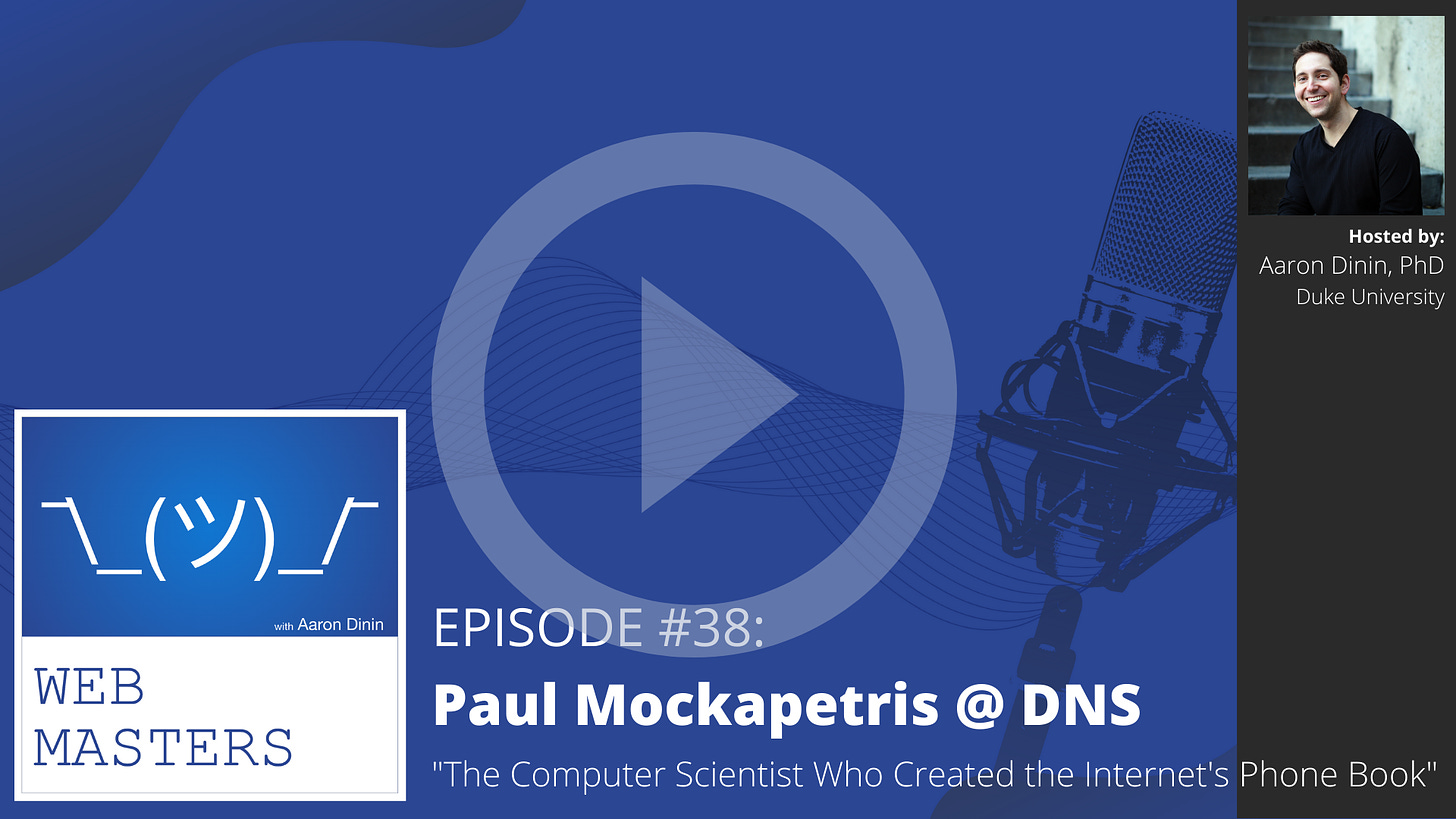Entrepreneur Office Hours - Issue #36
Are accelerators worth it? And what to do after you've built your startup backwards
Someone sent me a question about startup accelerators. As I’ve mentioned a few times around the Web, I’ve done three of them… which is kind of like failing the second grade three times. On the plus side, I’ve got lots of experience with accelerators and lots of thoughts about them. Honestly, I’ve got too many thoughts for a single EOH Q&A, but, in this issue, I’ve tried to distill some of thoughts down to a five important ones.
Also this week, I spent some time expanding on an issue from last week. Specifically, last week I wrote a lot about “building startups backwards” and why you don’t want to do it. But what if you already have? I give some practical advice for how to move forward.
Lastly, Web Masters is back this week with an awesome guest: Paul Mockapetris. He’s Internet royalty. Paul literally invented domain names. How cool is that? Unfortunately for him he didn’t buy any domains after he invented them. Whoops!
As usual, thanks for reading, liking, and sharing. And, if you’ve got questions, be sure to send them.
-Aaron
So… You Built Your Startup Backwards — Now What?
If you’ve already built a product before identifying a market, you don’t want to have to start from scratch. So here are five practical steps you can take to help overcome the most common mistake in entrepreneurship.
The Computer Scientist Who Created the Internet's Phone Book
The Domain Name System -- DNS -- is like the Internet's phone book. It's how computers match URLs to IP addresses in order to help you do things like look at web pages or send emails. Even though the system seems like an obvious way of structuring the Internet now, that wasn't always the case. On this episode of Web Masters, we hear from Paul Mockapetris, the man who invented DNS, as he explains how he came up with the solution that ultimately made the Internet infinitely scalable.
Listen to the latest episode now on:
…or search “Web Masters” wherever you listen to your favorite podcasts.
What’s the Best Book About Entrepreneurship?
With thousands of books about entrepreneurship to choose from, how can you tell which ones are actually useful? I’ve got some thoughts on it. You can read them here.
Two Simple Steps for Successfully Cold Emailing Venture Capitalists
Lots of people are going to try to tell you you’ll need a warm intro to potential investors from a mutual contact. Don’t believe them. That’s simply not true.
Office Hours Q&A
———————
QUESTION:
I think I read somewhere that you’ve done three startup accelerators. My company just got accepted to our first one. Any advice before we go? How can we get the most out of our accelerator experience?
Thanks for your advice!
- Isha
------------------
Oh gosh… I have soooooooooooo many thoughts about accelerator programs. I could probably write an entire issue of EOH on them and still just scratch the surface.
You’re right that I’ve done three of them. The first was DreamIt Ventures, back when that was one of the more prestigious programs. I’m not too sure what they’re up to these days, but I think their model has shifted a bit. The second was a local (to me) accelerator called The Startup Factory. And the third was 500Startups, which is, of course, one of the Big 3 (the other two being YCombinator and Techstars).
Rather than try to vomit out every possible thought I have about accelerators, I’m going to stick to a few high-level things that will hopefully be helpful.
Thought #1: All accelerators are not created equal
Every accelerator program is structured differently with different goals, different resources, different opportunities, and different expectations. Not knowing which one you’re joining, I can’t give specific thoughts on yours, but I do suggest you carefully research the one you’re considering before joining. The best way to do it is by talking with the founders of their portfolio companies. Try to get a good mixture of founders from companies that are still alive and ones that have shut down so you get a balanced report.
Thought #2: You can do more than one
I don’t mean this in the sense that I’ve done three or that it’s even a good idea. Instead, I’m just pointing out that you’re not limited to one and only one, and that’s probably a good thing. In fact, one of my companies actually went through two accelerators because, as noted above, all accelerators are not created equal. Specifically, my company did the local accelerator when it was just getting started. A couple years later we went to 500Startups. At the first accelerator, we were all basically “idea stage” companies or slightly beyond. In contrast, the kinds of companies at 500Startups shocked me. Most of us were already generating decent revenues, and many, including my company, had already raised significant capital. In other words, know that “startup accelerator” doesn’t just mean “new startups.” Really, an ideal accelerator is exactly what the name implies -- it’s an intensive program where you focus carefully on one or two important aspects of your company and try to make significant traction in a short amount of time using the accelerator’s additional resources.
Thought #3: Don’t worry too much about the equity
Accelerators take a decent chunk of equity. Some people say it’s too much. Honestly, I’d say this is a non-issue. Once you’ve decided to go the accelerator route, you’re on a venture trajectory anyway, which means you’re going to get diluted. If you’re lucky enough to get to an exit, the extra point or two the accelerator took early on in your company’s development isn’t going to make much of a difference.
Thought #4: Don’t try to do everything
Good accelerators are going to offer tons of opportunities: speakers; investor meetings; networking opportunities; social opportunities; and on and on. The people running the accelerator are going to try to tell you to attend everything. That’s because, from their perspective, they’re working hard to put together events and they don’t want poor turnout. But, from your perspective, the events could be a waste of time. Don’t forget that you’re there to work on your business, so that’s what you should focus on. If one of the events/opportunities being offered seems like it could help your business, do it. If not, don’t do it. Simple as that.
Thought #5: Accelerators aren’t magic bullets
The first time I joined an accelerator, I thought it was a guaranteed ticket to startup superstardom. And, to be fair to the naive young entrepreneur I was, that’s exactly how accelerators brand themselves. But let’s be clear: accelerators are not magic bullets. Nobody does the work for you. Nobody is going to hand you anything special just because you were in an accelerator. Instead, accelerators are entirely what you make of them. They provide additional resources. They provide great connections. And, most importantly, they provide a great space in which to focus 100% on your venture. But you still have to do all the work. If you’re going into the accelerator thinking you’ve “made it,” then you’re going to be sorely disappointed. However, if you’ve properly set your expectations, they can be a great resource for propelling your company forward if -- and only if -- you take proper advantage.
Good luck! And, when you’re done, send a message to let me know how it goes.
Got startup questions of your own? Reply to this email with whatever you want to know, and I’ll do my best to answer!








